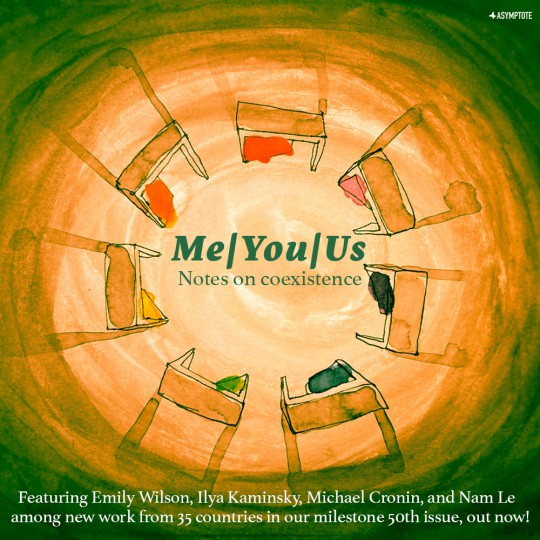Ilya Kaminsky’s “Reading Dante in Ukraine” makes an impassioned case for the crucial role of art amid the horrors of war. What we need, as Dante’s journey shows us, is to defend ourselves with it: a tune to walk to, even in the underworld, as long as one still walks. In Miklós Vámos’s “Electric Train,” translated by Ági Bori‚ the question-answer format gives the piece levity and rhythm, and the counterpoint of the humor interplaying with the troubled relationships brings it powerful depth. I found wisdom in the wry humor of Jaime Barrios Carrillo’s poems in David Unger’s translation. I love the image of angels spending the evening in their hotel rooms, ironing their enormous white wings.
—Ellen Elias-Bursac, Contributing Editor
The masterful language in Ági Bori’s translation, as though hand-holding the reader through a children’s story, and the simple act of gifting a present in the story belie the depth and complexity of emotional turmoil that wash over Miklós Vámos’s characters in “Electric Train,” a turmoil that seemingly hits out of nowhere like a wave yet in fact stems from a deep brewing well of built up memories and tensions. The contrast highlights all the more the challenges, and perhaps even limits, of recognizing and understanding another’s intentions, experiences, and feelings.
Rage, sorrow, resilience, helplessness, hope, a hunger for life and love and connection, grief, a numbing screaming despair: it is difficult to put into words the sensations that ran through me as I read Samer Abu Hawwash’s “My People” in Huda J. Fakhreddine’s translation. It cannot possibly compare to the feelings and thoughts of Samer Abu Hawwash and the Palestinian people, to the reality of having each day and moment narrow down to dried bread and tear tracks.
I was intrigued by Laura Garmeson’s discussion, in her review of Brazilian author Itamar Vieira Junior’s Crooked Plow, of the tongue as “both creator and destroyer. It has the power to make and unmake worlds.” It is a through line in Crooked Plow that reminds us of the power and possibilities of language and story to shape our lives. Garmeson’s review, in a way, is also a fire that kindles awareness of Itamar Vieira Junior’s work and the legacies, realities, and possible futures for Afro-Brazilian communities. The tongue as symbol also feels like a through line between these pieces in their rumination on what is gained and lost and pushed aside in the choices we make of what, how, and when we say (or write) things, or not.
—Julie Shi, Senior Executive Assistant



